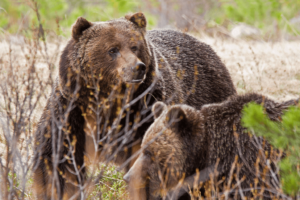

Coexisting with Grizzly Bears
October 18, 2023
- •
- •
- •
While human encounters with grizzly bears are quite common, grizzly bear attacks are rare, and fatal attacks are even more uncommon. The recent tragic death of a couple and their dog in Banff National Park from a grizzly bear attack has sparked a conversation about the grizzly population in Alberta and how to reduce human-wildlife conflict.
In these conversations, it’s important to remember the precarious status of grizzlies in the province and it’s crucial to understand the drivers of human-wildlife conflict to determine how to prevent them.
In the 1800s, the grizzly population in Alberta was estimated to be between 6,000 and 9,000 bears. Over the years, inadequate hunting regulations along with habitat loss and fragmentation led to drastic declines in their numbers. In 2002, when the grizzly population was estimated to be fewer than 1,000, the Government of Alberta’s Endangered Species Conservation Committee recommended grizzly bears be designated as a threatened species, but the province did not act upon that recommendation. The grizzly bear hunt was finally suspended in 2006 and the Alberta Grizzly Bear Recovery Plan was approved in 2008. It took two more years for grizzly bears to be listed as threatened after a Government of Alberta status report in 2010, which estimated the grizzly bear population to be only 691 individuals outside of Banff and Jasper National Parks. The most recent evaluations of the grizzly bear population reported by the Government of Alberta estimate between 856 to 973 individuals, suggesting that the population is recovering in certain areas.
While some people worry the bears’ increasing population could mean more conflict with people, it is also worth noting that Alberta’s human population is increasing, and popular wilderness areas like Kananaskis and Banff National Park are experiencing record levels of visitation in recent years. With more people getting out to enjoy wilderness areas, we can expect more conflict between people and wildlife. However, a common assertion is that bears must be killed in order to avoid conflict.
A study published in 2016 in Scientific Reports by Artelle et al. found that food abundance (or lack of it) is a key factor influencing human-grizzly conflict in British Columbia; grizzly bears were more aggressive in years when their natural food abundance was lower. The study also found that hunting grizzly bears and euthanizing problem bears had no significant effect on the frequency of grizzly bear conflict. The results of this study suggest that re-establishing a grizzly bear hunt in Alberta would be unlikely to reduce conflict between bears and people.
There are several effective alternatives to hunting and killing grizzlies. Public education and management of bear attractants can be very effective tools for reducing conflict. The 2020 updated Alberta Grizzly Bear Recovery Plan recommended that the Alberta government hire regional human-wildlife conflict specialists to address this issue and protect the public. While these regional roles have not been filled, the only provincial human-wildlife conflict specialist retired in spring of 2021 and has not been replaced.
The first step that the government should take to address human-wildlife conflict, and protect people and bears, is to fill these crucial positions. Grizzly bears are an important part of Alberta’s wilderness, and coexisting peacefully means taking a responsible science-based approach to preventing conflict.
– Devon Earl, AWA Conservation Specialist (dearl@abwild.ca)
Artelle, K., Anderson, S., Reynolds, J. et al. Ecology of conflict: marine food supply affects human-wildlife interactions on land. Sci Rep 6, 25936 (2016). https://doi.org/10.1038/srep25936
This is an excerpt from AWA’s newsletter, Wild Horizons. To sign up for the newsletter, click here.

